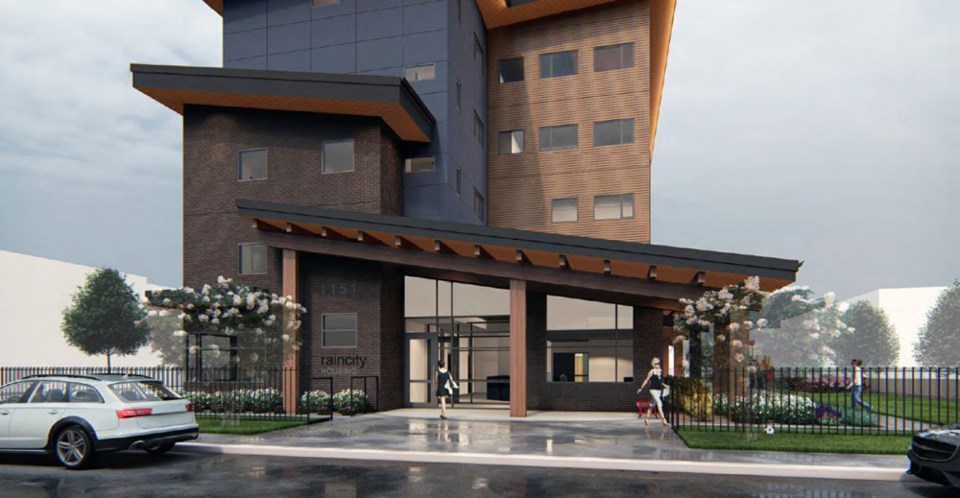District of North Vancouver council has given their blessing to an affordable housing project for women and their families facing homelessness.
Council voted unanimously Monday night to approve the 60-unit, five-storey supportive housing project on a district-owned parking lot at 1577 Lloyd Ave. Rents in the building will be either at shelter rates, of $375 to $660 per month, or geared to household income, of $901 to $1,461 per month. The housing will have 24/7 staffing from RainCity Housing and Support Society for programming and support.
When it came to a public hearing held last month, the vast majority of community members who wrote in or attended online were in support. A few nearby residents and business owners, however, raised fears the project would result in more drug use in the streets nearby.
Council members, though, largely agreed those fears were overblown, and found the project would save lives.
Coun. Megan Curren said she was proud to support a project that would be a step toward addressing some of the most acute housing needs for marginalized women.
“Women and gender-diverse people face profound violence on the streets and in public systems and are regularly separated from their children because of their housing status and exposure to violence. Despite this, housing policy rarely focuses on their realities, resulting in an acute lack of women-only, trauma-informed housing services,” she said. “I feel that we can help address this shameful reality by advancing this supportive project.”
The light-industrial lots where the project will be built were last assessed at $9.242 million, and the district will remain the owner of the land.
Coun. Jim Hanson called it a “wonderful upgrade” from an overflow parking lot for car dealerships.
“The social benefits of this kind of proposal are obvious. Simply put, we need more of this all across British Columbia if we seek to address some of the most significant social challenges that we face,” he said. “I do not believe very sincerely that the project will create any kind of challenges to safety or livability to the surrounding neighbourhood.”
Coun. Lisa Muri voted in favour of the rezoning but also acknowledged the concerns raised by the community and asked if it would still be possible for the district to prohibit drug use at the site. Muri added that the complexity of poverty, trauma and addiction will make lasting change difficult.
“Shelter does not deal with addiction. This is a Band-Aid solution, in my opinion. There's not enough support to give the people that are going into this housing ways to get out of their addiction,” she said.
Coun. Jordan Back expressed faith in the services that RainCity would provide.
“By supporting this development, we are planting the seeds for something that is going to grow and something that’s going to change a lot of lives in hugely positive ways,” he said. “And I think it’s something we’ll all be proud to have been a small part of.”
Coun. Mathew Bond stressed that the project could save lives and, based on his experience living next to social housing, there is nothing for the nearby community to worry about.
“We walk in the same parks together. We are the same people. We live in the same neighbourhood and it's so important that we embrace each other, and we recognize that with compassion and humanity, whatever someone's circumstances might be. That's what's really going to make the difference here,” he said.
Coun. Betty Forbes also predicted the new residents would fit in well, especially when their kids enroll in local schools.
“I think this is going to strengthen the whole neighbourhood. I think it'll probably come from the kids getting along well and the adults will see that's what they should be doing too. If they have any trepidations, I think they'll go away,” she said.
Mayor Mike Little pointedly rejected the “unfair” fear most of the opposition was based on.
“I'm sorry to say that was irrational. That was so far beyond what we've come to experience with low income, specialized housing throughout our community,” he said. “You wouldn't even know that they were specialized housing in a lot of our neighbourhoods. It was a hard time listening to that.”
In closing, Little laid down a challenge for the province to show up with capital to start buying more land on the North Shore to enable similar projects.



